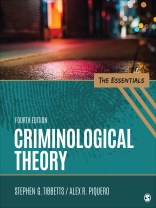Criminological Theory: The Essentials, Fourth Edition by Stephen G. Tibbetts and Alex R. Piquero is a brief yet comprehensive overview of the major concepts and perspectives of the key theories in the evolution of criminology.
Putting criminological theory in context, the acclaimed authors examine policy implications brought about by theoretical perspectives to show students the practical application of theories to contemporary social problems. The new edition has been thoroughly updated with the latest theoretical extensions and empirical research, with links made to specific theories and recent events.
Зміст
Chapter 1. Introduction to the Book: An Overview of Issues in Criminological Theory
Chapter 2. Preclassical and Classical Theories of Crime
Chapter 3. Modern Applications of the Classical Perspective: Deterrence, Rational Choice, and Routine Activities or Lifestyle Theories of Crime
Chapter 4. Early Positive School Perspectives of Criminality
Chapter 5. Modern Biosocial Perspectives of Criminal Behavior
Chapter 6. Early Social Structure and Strain Theories of Crime
Chapter 7. The Chicago School and Cultural and Subcultural Theories of Crime
Chapter 8. Social Process and Learning Theories of Crime
Chapter 9. Social Reaction and Critical Models of Crime
Chapter 10. Feminist Models of Crime
Chapter 11. Life-Course Perspectives of Criminality
Chapter 12. Integrated Theoretical Models and New Perspectives of Crime
Про автора
Alex R. Piquero is Professor and Chair of the Department of Sociology & Criminology and Arts & Sciences Distinguished Scholar the University of Miami and Professor of Criminology at Monash University in Melbourne, Australia. He was Co-Editor of the Journal of Quantitative Criminology from 2008 to 2013 and currently serves as Editor of Justice Evaluation Journal. Prior to joining the University of Miami in August 2020, he was Ashbel Smith Professor of Criminology at The University of Texas at Dallas, where he also served as Associate Dean for Graduate Programs in the School of Economic, Political and Policy Sciences and Director of Social Impact in the Office of Research. He has also served on the faculties of Florida State University, University of Maryland, John Jay College of Criminal Justice/City University of New York, University of Florida, Northeastern University, and Temple University. He has published over 475 peer-reviewed articles in the areas of criminal careers, race/immigration and crime, crime prevention, criminological theory, and quantitative research methods, and has authored several books including Key Issues in Criminal Careers Research: New Analyses from the Cambridge Study in Delinquent Development (Cambridge University Press, with David P. Farrington and Alfred Blumstein), Handbook of Quantitative Criminology (Springer, with David Weisburd), and Developmental Criminology and the Crime-drop: A Comparative Analysis of Criminal Careers in Two Birth Cohorts (Cambridge University Press, with Jason Payne). His work has been cited over 48, 000 times (h-index=116). A 2019 article in Plos Biology identified him as being included among the top 100, 000 most-cited scientists in the world. In November 2019 and November 2020, he was recognized by the Web of Science Group as one of the world’s most influential researchers (i.e., a Highly Cited Researcher). He has served as Executive Counselor with the American Society of Criminology, Member of the National Academy of Sciences Panel Evaluating the National Institute of Justice, Member of the National Academy of Sciences Panel on A Prioritized Plan to Implement a Developmental Approach in Juvenile Justice Reform, Member of the National Academy of Sciences Panel on Modernizing the Nation’s Crime Statistics, Member of the Racial Democracy, Crime and Justice Network at Ohio State University, and Member of the Mac Arthur Foundation′s Research Network on Adolescent Development & Juvenile Justice. He has given congressional testimony on evidence-based crime prevention practices in the area of early-family/parent training programs, and has provided counsel and support to several local, state, national, and international criminal justice agencies, including various police and correctional agencies. In 2015, US Attorney General Eric Holder appointed him to the Office of Justice Programs Science Advisory Board. In September 2019, Dallas Mayor Eric Johnson appointed him to the Mayor’s Task Force on Safe Communities and Dallas County District Attorney John Creuzot appointed him as a member of the DA’s Urban Crime Initiative. In December 2020, Miami-Dade State Attorney Katherine F. Rundle appointed him to the Executive Committee of the Continuing Justice Reform Commission. In March 2021, he was elected to the Council on Criminal Justice. Professor Piquero is past recipient of the American Society of Criminology′s Young Scholar (2002) and E-Mail Mentor of the Year (2005) Awards, Fellow of both the American Society of Criminology (2011) and the Academy of Criminal Justice Sciences (2011), recipient of the Western Society of Criminology President’s Award (2017), recipient of the Academy of Criminal Justice Sciences Bruce Smith, Sr. Award (2019), recipient of the Lifetime Achievement Award from the Division of Developmental & Life-Course Criminology of the American Society of Criminology (2020) and has also received numerous te












